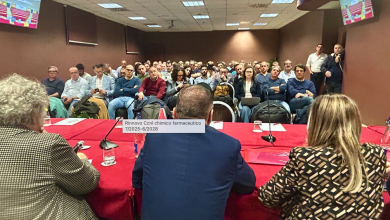
We report large excerpts from the Judgment n. 131/2017 of the Court of Marsala in relation to the false agency relationship established by a pharmaceutical company with a Pharmaceutical Scientific Representative.
 Today, the figure and activity of the scientific informant, following the issuing of a series of directives which concerned the homogenization of the provisions of the law on scientific information, operating in the single member countries of the European Community (in particular , Directive 92/28 EEC, transposed in Italy with Legislative Decree 541 of 30 December 1992), is regulated by Decree 24 April 2006 n. 219 .
Today, the figure and activity of the scientific informant, following the issuing of a series of directives which concerned the homogenization of the provisions of the law on scientific information, operating in the single member countries of the European Community (in particular , Directive 92/28 EEC, transposed in Italy with Legislative Decree 541 of 30 December 1992), is regulated by Decree 24 April 2006 n. 219 .
There is, therefore, a fundamental and undeniable difference between the service requested of the ISF and that, on the other hand, demanded by the agent; the former is required to carry out a drug propaganda activity, based on the best dissemination of scientific data relating to it, aimed at convincing and stimulating doctors to prescribe them, without this activity (as a rule) being accompanied by receiving orders and, therefore, concluding contracts; the FSI must, therefore, by definition, place its working energies at the disposal of the pharmaceutical company, now in a subordinated form, now as an independent professional, without assuming an obligation of resultsi.e. without the number of contracts concluded taking on relevance for the purposes of assessing one's own fulfilment, or for the purposes of calculating his remuneration, precisely because this activity is not deducted in the contract. The well-known and seemingly obvious circumstance that this scientific dissemination activity is taken on by pharmaceutical companies, beyond any legal obligation, in order to promote the greater commercial diffusion of their products, certainly does not change the object of the ISF's service and the objective cause of its contract, the aforementioned purpose remaining extraneous to it.
The agent, on the other hand, in the context of an obligation not of means but of result, must also achieve the promotion of the conclusion of contracts, since his remuneration is directly connected to these and commensurate.
On the basis of these considerations, both the jurisprudence of the merits and of legitimacy have repeatedly underlined that "the activity of promoting the conclusion of contracts on behalf of the principal, which constitutes the typical obligation of the agent, cannot consist of a mere activity of propaganda, but must consist in the activity of persuading the potential customer to place orders for the principal's products. Therefore, when the auxiliary of a pharmaceutical company is limited to promoting the product to doctors, and therefore only indirectly promoting the principal's business, this auxiliary is not an agent but a scientific propagandist, whose activity can be the object of employment or self-employment or sometimes it can be added to that of agent, when the latter also takes care of the stipulation of individual contracts".
The Supreme Court further explains: "...while the simple propagandist's activity consists in persuading potential customers of the opportunity to purchase, informing them of the existence of the product and illustrating its product and commercial characteristics, the agent's activity must also achieve the promotion of the conclusion of contracts, so as to be able to base one's remuneration on the individual contracts concluded on behalf of the principal (art. 1742 of the civil code). In other words, the agent's work, which can be qualified as self-employment, is essentially characterized by the fact that the remuneration is given by commissions, ie by sums of money proportionate to the individual contracts promoted by the agent and to their economic value. It may also happen that the commission is predetermined in a fixed or lump sum amount, but even in this exceptional case it refers to the business promoted by the single agent.... The performance of the propagandist, on the other hand, is characterized by an activity that he must carry out and whose remuneration is not directly connected with the economic result of that activity, carried out by the individual worker. It can thus be concluded by stating that, while the obligation assumed by the propagandist towards the employer is defined as an obligation "of diligence", or "of means", in the sense that in it the creditor can legitimately demand nothing else but the diligent behavior of the debtor, without guarantee that a precise result will be achieved and thus recognizing in it the characteristics of subordinate work, the obligation assumed by the agent towards the principal qualifies as "of result", failing which the debtor is objectively in default , assuming from this character the guise of the self-employed worker. In this way the form of remuneration has no meaning in itself as it is connected to the content of the obligation, since the commission is linked to the obligation of result (self-employment) while the consideration of a different kind is connected to the obligation of means ( subordinate work)" (so, Cassation June 22, 1999, n. 6355; in the same sense, Cassation June 22, 1990, n. 6291; Cassation 19.8.1992 n. 9676; Cassation labor section n. 19394/2014 ).
 The remuneration for the activity performed was not commensurate with the business procured by the agent (nor could it have been, since this was not the content of the service requested of him) but consisted of a fixed part (initially 20,000.00 euros per year) and another variable according to the data calculated according to the IMS surveys in the area assigned to it, i.e. the sales data of pharmaceutical products made to local pharmacies; this form of commensuration of the salary, therefore, (in relation to which there was also copious confirmation from the testimonial evidence assumed) did not anchor the same to results directly attributable to the activity of the ISF, but rather to the results achieved by the actual agents (“of pharmacy”) i.e. by subjects who, albeit also thanks to the propaganda activity previously carried out by the ISFs, concluded the contracts in the same reference area; it therefore seems undeniable that this remuneration parameter, like the "fixed" one, goes beyond any synallagmatic criterion related to an expected result from its performance, not even evaluated in terms of the number of visits carried out in the period, responding rather to a criterion of consideration with respect to to the simple fact of making one's working energies available.
The remuneration for the activity performed was not commensurate with the business procured by the agent (nor could it have been, since this was not the content of the service requested of him) but consisted of a fixed part (initially 20,000.00 euros per year) and another variable according to the data calculated according to the IMS surveys in the area assigned to it, i.e. the sales data of pharmaceutical products made to local pharmacies; this form of commensuration of the salary, therefore, (in relation to which there was also copious confirmation from the testimonial evidence assumed) did not anchor the same to results directly attributable to the activity of the ISF, but rather to the results achieved by the actual agents (“of pharmacy”) i.e. by subjects who, albeit also thanks to the propaganda activity previously carried out by the ISFs, concluded the contracts in the same reference area; it therefore seems undeniable that this remuneration parameter, like the "fixed" one, goes beyond any synallagmatic criterion related to an expected result from its performance, not even evaluated in terms of the number of visits carried out in the period, responding rather to a criterion of consideration with respect to to the simple fact of making one's working energies available.
Therefore, in the case in question, we cannot even speak of so-called indirect commissions, as any reference to a result that can be achieved directly by the ISF escapes this form of remuneration; nor does the reference to art. 1748 paragraph 2 of the civil code, according to which the recognition of commissions is also foreseen in the agency contract also for contracts not concluded by the agent, but directly by the principal in the area of competence of the former.
The ISF was only required to contact the doctors, and the planning of its work concerned rather the frequency and methods of organization of these visits, never the quantity of orders that these visits had, even indirectly, product. Furthermore, every possible form of control by the "superiors" concerned this aspect, ie the number and frequency of visits, as well as the correctness of the scientific information offered to the doctors. Then, it is obvious that we can speak of only indirect repercussions of the ISF's work on sales, given that the interlocutor of the ISF is always the "prescribing" doctor, never the direct purchaser of pharmaceutical products (pharmacy); so that, also in this respect, the propaganda activity of the ISF, as it lacks direct contact with the operators of the "market", appears to be estranged from the typical scheme of the agency contract. These considerations are then confirmed by the circumstance, absolutely undisputed here, that both ISF and real "pharmacy" agents operated in the same area, with completely distinct and different services.
By adopting the form of an agency contract, the parties wished to establish an ongoing employment relationship coordinated with the company's needs, according to the methods specified in the aforementioned agency contract dated 02/09/2012. The employment relationship of the appellant, while integrating a coordinated and continuous collaboration, mainly personal and without  subordination, cannot be ascribed to any of these categories: in particular, not to that of agents as discussed above, nor to that of "protected" intellectual professions as they are not subject to enrollment in any register, nor, yet least of all, it can be minimally considered an occasional collaboration.
subordination, cannot be ascribed to any of these categories: in particular, not to that of agents as discussed above, nor to that of "protected" intellectual professions as they are not subject to enrollment in any register, nor, yet least of all, it can be minimally considered an occasional collaboration.
From the above premises and from the obvious and uncontested consideration that the agency contract stipulated between the parties did not contain the indication of any specific project, it can therefore only achieve, in accordance with what was deduced and requested by the appellant, the constitution, ex nunc, between the parties to an open-ended employment relationship.
The non-existence of "just cause" therefore makes the dismissal illegitimate on the merits. Consequently, having declared the existence of a subordinate employment relationship between the appellant and MSD Italia srl, and the illegitimacy of the dismissal, the latter must be annulled and MSD Italia srl, the effective employer, must be ordered to reinstate the appellant in the place of work, in the position of scientific informant of the drug, and therefore with classification in the corresponding qualification envisaged by the sector CCNL, and to the payment of an indemnity commensurate with twelve months' salary to the last global salary in fact, since the perception of different incomes deriving from other work activities did not emerge, to be deducted from the same indemnity, in addition to the payment of the related contributions social security and welfare payments from the day of dismissal until the day of effective reinstatement, plus interest to the extent legal.
Attached: Judgment.Court.Marsala
Related news: La Spezia Court: the ISF cannot be assessed on the basis of market trends
Court of La Spezia. Judgment. 370.2016
Art. 122 Legislative Decree 219/06
Cassation. The scientific informant is not a commercial agent
Farmindustria code of ethics. 2.5 The pharmaceutical sales representative must not exercise health or paramedical professions, or in any case pertaining to the use of the drug, even if unpaid, nor any other continuous activity which involves a subordinate employment relationship.
Ed.: This sentence adds to many others on the same subject. But not only is the ISF not a seller, but we recall that the law requires that information on medicines must be provided to the doctor and pharmacist by scientific representatives who must report to the scientific service on which they depend.
Furthermore, as reported by almost all the regional regulations on scientific information, as a rule the ISFs have to carry out their activity with doctors alone; the presence of the area manager or other professional figures unrelated to scientific information activity, is admitted only in the case of ISF without specific experience and in any case limited to the 12 months following the start of the activity.
Given that the violation of the law is proven by a court ruling, we await the provisions of AIFA and Farmundustria.
Maybe we are just dreamers.





